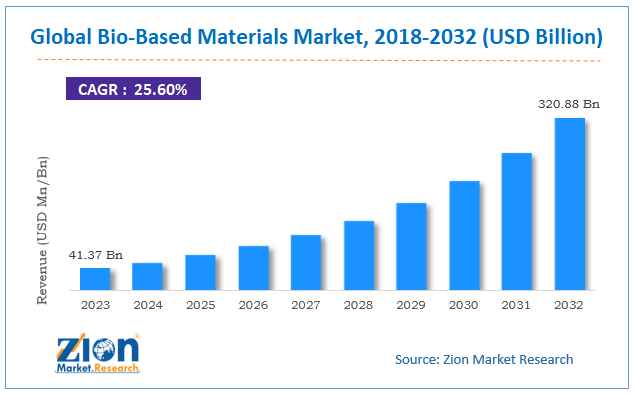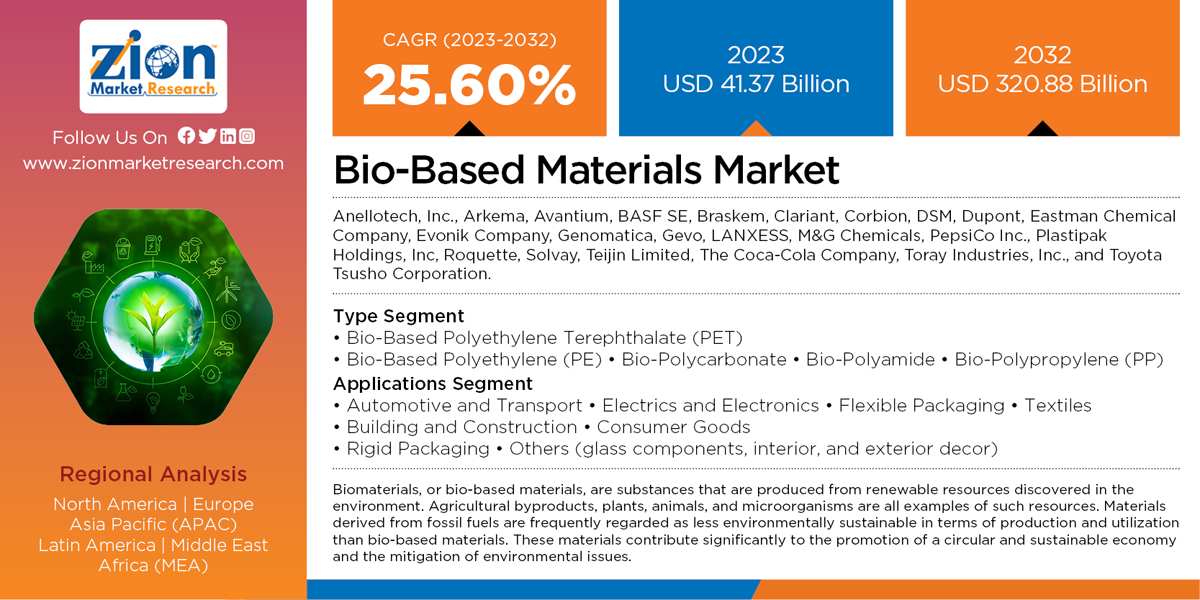Bio-Based Materials Market Size, Share, Trends, Growth 2032

Bio-Based Materials Market by Type (Bio-Based Polyethylene terephthalate (PET), Bio-Based Polyethylene (PE), Bio-Polycarbonate, Bio-Polyamide, and Bio-Polypropylene (PP)) and by Applications (Rigid Packaging, Flexible Packaging, Textiles, Automotive and Transport, Consumer Goods, Building and Construction, Electrics and Electronics, and Others), And By Region - Global And Regional Industry Overview, Market Intelligence, Comprehensive Analysis, Historical Data, And Forecasts 2024-2032
| Market Size in 2024 | Market Forecast in 2032 | CAGR (in %) | Base Year |
|---|---|---|---|
| USD 41.37 Billion | USD 320.88 Billion | 25.60% | 2023 |
Bio-Based Materials Market: Industry Perspective
The global bio-based materials market size was worth around USD 41.37 billion in 2023 and is predicted to grow to around USD 320.88 billion by 2032 with a compound annual growth rate (CAGR) of roughly 25.60% between 2024 and 2032.
Bio-Based Materials Market: Overview
The term “biobased” means that the material which is partly or wholly derived from renewable source i.e. biomass. The bio-based materials are used to replace petrochemical plastics and other fossil fuel-based chemicals. Bio-based materials do not need the mining and emission of fossil carbon as it uses feedstock containing biogenic carbon. Thus, bio-based materials do not depend on non-renewable energy as feedstock reduces climate change impact by the elimination of carbon dioxide from the atmosphere. Furthermore, the support received from policymakers and advisors at the national and supranational levels for bio-based materials, as it is considered more sustainable economies such as the bio-based economy and the circular economy, will propel the market over the forecast period.
Bio-based materials are used in every market ranging from the packaging industry to the construction business due to its wide utilization. Since the late 1990s, polymer industry has faced two major restraints that are depletion of fossil fuels and global warming. To overcome these hindrances, one can use sustainable resources instead of using fossil-based resources. Biobased materials are being applied to general and engineering situations. For example, PEF provides good gas barrier properties, hence it is used in films, bottles, and other packaging materials in the food and beverage sector and many other industries. Whereas, due to development in the physical durability, stability, and processability of PLA, it has been prominently used in the packaging industry.
The study includes drivers and restraints for the bio-based materials market along with the impact they have on the demand over the forecast period. Additionally, the report includes the study of opportunities available in the bio-based materials market on a global level.
In order to give the users of this report a comprehensive view of the bio-based materials market, we have included a competitive landscape and analysis of Porter's Five Forces model for the market. The study encompasses a market attractiveness analysis, wherein type segment and application segments are benchmarked based on their market size, growth rate, and general attractiveness.
The report provides a company market share analysis in order to give a broader overview of the key players in the market. In addition, the report also covers key strategic developments of the market including acquisitions & mergers, new technology launches, agreements, partnerships, collaborations & joint ventures, research & development, technology, and regional expansion of major participants involved in the market on a global and regional basis. Moreover, the study covers price trend analysis, and product portfolios of various companies according to region.
Bio-Based Materials Market: Segmentation
The study provides a decisive view of the bio-based materials market by segmenting the market based on type, applications, and regions. All the segments have been analyzed based on present and future trends and the market is estimated from 2024 to 2032.
Based on the type, the bio-based materials market is segmented into bio-based polyethylene terephthalate (PET), bio-based polyethylene (PE), bio-polycarbonate, bio-polyamide, and bio-polypropylene (PP).
Based on applications, the market is segmented into rigid packaging, flexible packaging, textiles, automotive and transport, consumer goods, building and construction, electrics and electronics, and others.
Bio-Based Materials Market : Report Scope
| Report Attributes | Report Details |
|---|---|
| Report Name | Bio-Based Materials Market Research Report |
| Market Size in 2024 | USD 41.37 Billion |
| Market Forecast in 2032 | USD 320.88 Billion |
| Growth Rate | CAGR of 25.60% |
| Number of Pages | 215 |
| Key Companies Covered | Anellotech, Inc., Arkema, Avantium, BASF SE, Braskem, Clariant, Corbion, DSM, Dupont, Eastman Chemical Company, Evonik Company, Genomatica, Gevo, LANXESS, M&G Chemicals, PepsiCo Inc., Plastipak Holdings, Inc, Roquette, Solvay, Teijin Limited, The Coca-Cola Company, Toray Industries, Inc., and Toyota Tsusho Corporation |
| Segments Covered | By Type, By Application and By Region |
| Regions Covered | North America, Europe, Asia Pacific (APAC), Latin America, Middle East, and Africa (MEA) |
| Base Year | 2023 |
| Historical Year | 2018 to 2022 |
| Forecast Year | 2024 - 2032 |
| Customization Scope | Avail customized purchase options to meet your exact research needs. Request For Customization |
Bio-Based Materials Market: Regional Analysis
The regional segmentation includes the current and forecast demand for North America, Europe, Asia Pacific, Latin America, and the Middle East & Africa with its further divided into major countries including the U.S., the U.K., Germany, France, Italy, Spain, China, Japan, India, and Brazil. This segmentation includes demand for bio-based materials market based on individual types and applications in all the regions and countries.
Europe held a dominant share of the global market for bio-based materials in the 2017 and region is projected to continue with its regional supremacy over the forthcoming years as well. The growth of this regional market is attributed to the favorable government policies and up-coming new product lines by the prominent market players. European Commission has framed strategy, i.e., Europe 2020, to reduce the factors which are affecting climate change with a focus on reducing GHG emission. Asia Pacific bio-based materials market is projected to grow at a significant CAGR, due to rising usage of electronic gadgets along with growing demand for sustainable finished products in this region.
Bio-Based Materials Market: Competitive Analysis
The global bio-based materials market is led by players like:
- Anellotech Inc
- Arkema
- Avantium
- BASF SE
- Braskem
- Clariant
- Corbion
- DSM
- Dupont
- Eastman Chemical Company
- Evonik Company
- Genomatica
- Gevo
- LANXESS
- M&G Chemicals
- PepsiCo Inc
- Plastipak Holdings, Inc
- Roquette
- Solvay
- Teijin Limited
- The Coca-Cola Company
- Toray Industries, Inc
- Toyota Tsusho Corporation
This report segments the global bio-based materials market as follows:
Global Bio-Based Materials Market: Type Segment Analysis
- Bio-Based Polyethylene Terephthalate (PET)
- Bio-Based Polyethylene (PE)
- Bio-Polycarbonate
- Bio-Polyamide
- Bio-Polypropylene (PP)
Global Bio-Based Materials Market: Applications Segment Analysis
- Automotive and Transport
- Electrics and Electronics
- Flexible Packaging
- Textiles
- Building and Construction
- Consumer Goods
- Rigid Packaging
- Others (glass components, interior, and exterior decor)
Global Bio-Based Materials Market: Regional Segment Analysis
- North America
- The U.S.
- Europe
- UK
- France
- Germany
- Asia Pacific
- China
- Japan
- India
- Latin America
- Brazil
- The Middle East and Africa
Table Of Content
Methodology
FrequentlyAsked Questions
Biomaterials, or bio-based materials, are substances that are produced from renewable resources discovered in the environment. Agricultural byproducts, plants, animals, and microorganisms are all examples of such resources. Materials derived from fossil fuels are frequently regarded as less environmentally sustainable in terms of production and utilization than bio-based materials. These materials contribute significantly to the promotion of a circular and sustainable economy and the mitigation of environmental issues.
Supportive government policies and regulations regarding renewable resources and sustainable practices can have a substantial effect on the expansion of the bio-based materials market. Regulations, subsidies, and incentives that encourage the use of bio-based materials can stimulate market growth. Consumers' desire for sustainable and eco-friendly products and their increasing consciousness of environmental issues may stimulate demand for bio-based materials. The purchasing decisions of consumers are being influenced by their preferences for products that have a reduced environmental impact.
The global bio-based materials market size was worth around USD 41.37 billion in 2023 and is predicted to grow to around USD 320.88 billion by 2032.
The global bio-based materials market with a compound annual growth rate (CAGR) of roughly 25.60% between 2024 and 2032.
The regional segmentation comprises present and projected demand for the following regions: North America, Europe, Asia-Pacific, Latin America, and the Middle East & Africa. Additionally, it is subdivided into significant countries such as the United States, United Kingdom, Germany, France, Italy, Spain, China, Japan, India, and Brazil. This market segmentation comprises the demand for bio-based materials across all regions and countries, broken down by specific categories and applications.
Anellotech, Inc., Arkema, Avantium, BASF SE, Braskem, Clariant, Corbion, DSM, Dupont, Eastman Chemical Company, Evonik Company, Genomatica, Gevo, LANXESS, M&G Chemicals, PepsiCo Inc., Plastipak Holdings, Inc, Roquette, Solvay, Teijin Limited, The Coca-Cola Company, Toray Industries, Inc., and Toyota Tsusho Corporation.
RelatedNews
HappyClients
Zion Market Research
Tel: +1 (302) 444-0166
USA/Canada Toll Free No.+1 (855) 465-4651
3rd Floor,
Mrunal Paradise, Opp Maharaja Hotel,
Pimple Gurav, Pune 411061,
Maharashtra, India
Phone No +91 7768 006 007, +91 7768 006 008
US OFFICE NO +1 (302) 444-0166
US/CAN TOLL FREE +1 (855) 465-4651
Email: sales@zionmarketresearch.com
We have secured system to process your transaction.
Our support available to help you 24 hours a day, five days a week.
Monday - Friday: 9AM - 6PM
Saturday - Sunday: Closed







